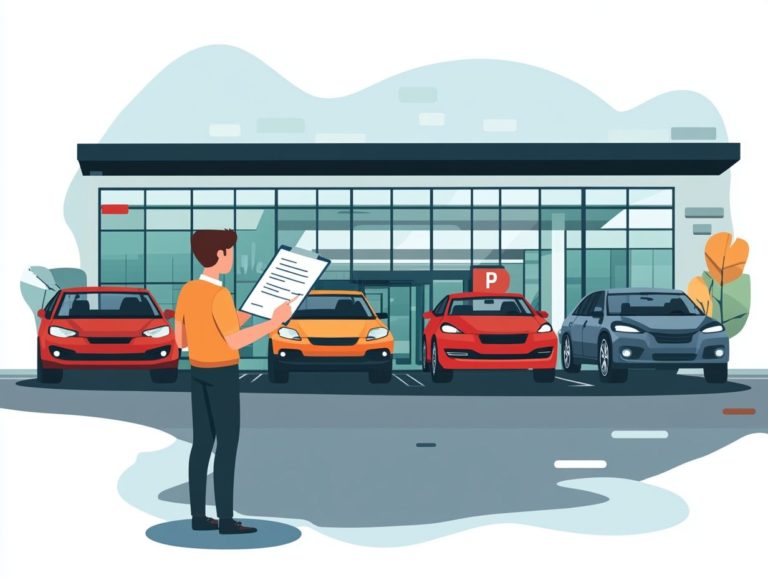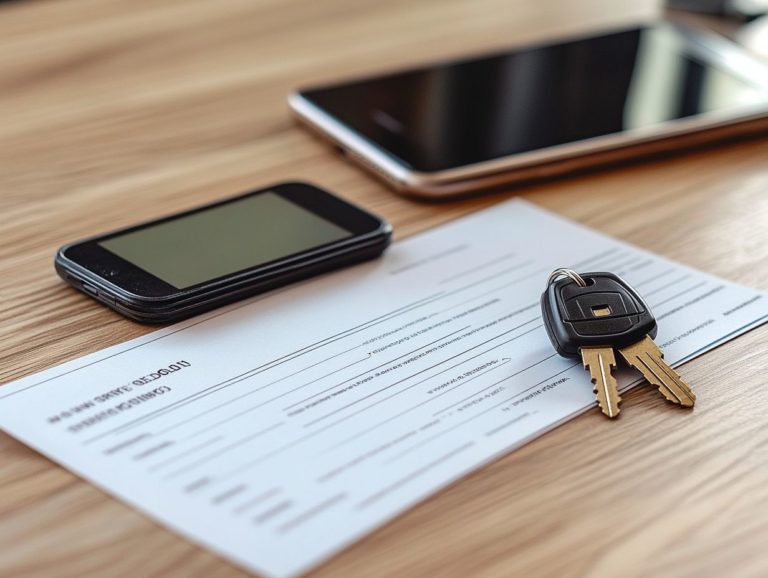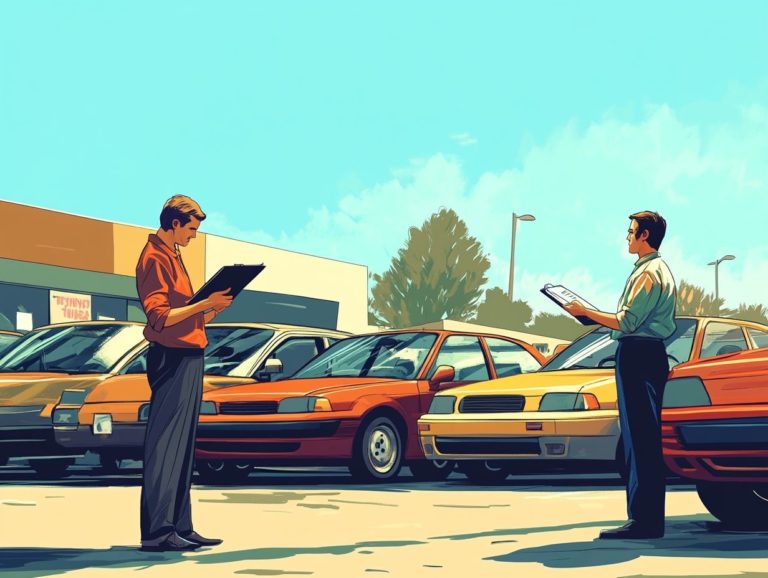What to Do After Buying a Used Car
Buying a used car can be exciting yet nerve-wracking. You need to research thoroughly and inspect the vehicle carefully before making your decision.
This guide delves into the critical facets of buying used, encompassing car history checks, ownership transfer, insurance options, and maintenance strategies. By applying these insights, you ll position yourself to ensure that your vehicle remains a reliable companion for many years ahead.
Contents
- Key Takeaways:
- Pre-Purchase Considerations
- Steps to Take After Buying a Used Car
- Maintenance and Upkeep
- Tips for Maximizing the Life of Your Used Car
- Frequently Asked Questions
- What should I do first after buying a used car?
- Is getting a professional inspection necessary for a used car?
- What should I do if I find any problems with the car?
- Should I get an extra protection plan?
- How do I transfer the title and ownership of the car?
- What should I do if I am not satisfied with the purchase?
Key Takeaways:

Act now! Research and inspect your used car carefully to avoid costly surprises and make a smart investment. After buying a used car, ensure you complete the necessary paperwork for the transfer of ownership and consider insurance and warranty options for added protection. Regular maintenance and prompt addressing of any issues are key to maximizing the lifespan of a used car and avoiding costly repairs in the long run.
Pre-Purchase Considerations
Having a comprehensive grasp of pre-purchase considerations is essential for ensuring a satisfying experience and steering clear of potential pitfalls that may arise from insufficient information.
Engaging in diligent research, such as conducting a check using the car’s unique identification number (VIN) and obtaining a vehicle history report, is vital in protecting yourself from hidden issues that could impact the car’s performance and value.
Familiarizing yourself with the intricacies of dealership paperwork and the relevant DMV requirements can greatly streamline your buying process, making it more efficient and less stressful.
Researching and Inspecting the Car
Researching and inspecting the car you wish to purchase is an essential step in the used car buying process. This diligence helps uncover any hidden issues that could impact the vehicle’s longevity and performance.
A thorough inspection whether conducted by certified mechanics or through your own meticulous checks should cover the exterior, interior, and engine components, ensuring that all scheduled maintenance has been properly followed.
By paying close attention to signs of wear and tear, rust, and any irregularities in the bodywork, you can gain valuable insights into the car’s overall condition. An integral part of this process involves conducting a thorough VIN check, which can reveal crucial information about the vehicle s history, including ownership records and any reported accidents.
Obtaining a vehicle history report is just as important; it provides a comprehensive overview of past incidents that might affect the vehicle’s future reliability. When dealing with private sellers, it s wise to ask detailed questions about maintenance logs and service records to ensure the car has been properly cared for.
After all, a well-maintained vehicle is likely to deliver dependable service to its new owner.
Understanding the Car’s History
Understanding a car’s history is essential for you to make an informed purchase. It offers valuable insights into previous ownership, potential damages, and any outstanding recall notices that could jeopardize safety.
A comprehensive vehicle history report doesn t just highlight the car’s accident record; it also provides critical information on damage disclosures and the status of any unresolved recalls.
By diving into this report, you can pinpoint any past accidents and gauge the severity of repairs undertaken, which can give you an idea of how well the vehicle has been maintained over time.
It’s vital to secure damage disclosures from the seller to ensure complete transparency regarding any repairs and their implications for future usability. Being aware of any outstanding recalls is equally crucial, as unresolved issues could not only compromise safety but might also lead to increased future car insurance premiums or limit your financing options.
A vehicle with a poorly documented history carries significant risks, including unexpected repair costs and compromised safety, underscoring the undeniable importance of thorough due diligence in your buying process.
Start your used car search today!
Steps to Take After Buying a Used Car
Once you ve successfully purchased a used car, follow some key steps to ensure a smooth transition into ownership.
First, prioritize the title transfer and vehicle registration. These steps officially document the change in ownership and grant you the legal right to drive.
Next, obtain car insurance. Without proof, you could face issues during registration at the Department of Motor Vehicles (DMV), especially if you need temporary tags.
Transfer of Ownership and Registration

Transferring ownership and registering your newly purchased car are vital for legal compliance. You must start the title transfer process, usually through the DMV, and be ready to pay sales tax, a tax based on the vehicle’s purchase price.
To get started, gather necessary documents like the signed title from the previous owner and proof of identity. A bill of sale is also essential.
Depending on your state, you might need to complete forms that declare your residency or provide additional vehicle information.
You can submit this paperwork at local DMV offices or, in some cases, online. Keep in mind that sales tax can vary, so budgeting for this cost is wise.
Each state has unique DMV requirements. These can influence the title transfer process, including checks for emissions or safety, so know the regulations in your area.
Insurance and Warranty Options
Selecting the right insurance and warranty for your used car is crucial. The right car insurance policy will safeguard your investment and provide peace of mind while driving.
Proof of insurance is often required for vehicle registration at the DMV. Understanding various policies, from liability to comprehensive coverage, can impact your financial security in case of an accident.
Consider your age, location, and driving history when looking for the right coverage. Explore warranty options like service contracts for extra protection against unexpected repair costs.
Evaluate different insurance providers carefully. Each may have unique terms that fit your situation differently. An informed choice helps you balance coverage needs with your budget.
Maintenance and Upkeep
Taking care of your used car is key to keeping it running strong and reliable. Regular maintenance, like oil changes and tire rotations, helps prevent serious issues.
Engaging qualified mechanics for routine checks allows you to tackle potential concerns before they grow. Early detection is vital for safety and reliability.
Scheduling Regular Maintenance
Scheduling regular maintenance is smart to ensure your car performs well. It minimizes unexpected breakdowns and costly repairs.
By setting a consistent schedule with qualified mechanics, you can track necessary services and stay informed about potential issues.
Incorporate procedures like oil changes and tire rotations to enhance your vehicle’s performance. Recognizing when to seek expert help is essential, especially when warning lights show up.
When choosing mechanics, consider their certifications and customer reviews. This can guide you to the best options in your area.
Investing in service contracts can be beneficial too. They provide scheduled maintenance at a fixed cost, simplifying financial planning and promoting timely check-ups.
Addressing Any Issues
Addressing any issues that arise with your used car promptly is essential for maintaining its performance and safety. When you spot problems whether during routine inspections or while driving consulting a mechanic right away can prevent minor issues from turning into costly repairs.
Familiarizing yourself with damage disclosures, which show any previous accidents or repairs, can guide your decisions regarding repairs and insurance claims. A thorough inspection can reveal common concerns like oil leaks, brake wear, or electrical problems that might not be immediately apparent.
Recognizing these signs early enables you to seek professional help, ensuring your vehicle remains in optimal working order. Work closely with mechanics to understand necessary repairs and associated costs, as knowing what to expect can significantly reduce stress in these situations.
Navigating insurance claims can often feel like traversing a maze; understanding your coverage and documenting any issues quickly is vital. Keeping track of damage disclosures is crucial, as they provide insights into past repairs and help you assess the overall reliability of your vehicle.
Tips for Maximizing the Life of Your Used Car

Let s dive into how you can maximize your car’s life! Taking good care of your car requires a dedicated commitment to proper care and maintenance, allowing you to extract the utmost value from your investment over time.
By following a proactive maintenance schedule and being vigilant about common pitfalls like neglecting minor repairs or overlooking scheduled upkeep you can significantly enhance your vehicle’s longevity and performance.
Proper Care and Maintenance
Proper care and maintenance are crucial for ensuring your used car remains reliable and efficient, ultimately extending its lifespan. By adhering to a scheduled maintenance plan and enlisting skilled mechanics for regular check-ups, you can prevent larger issues from arising.
Prioritize regular oil changes, as they keep the engine lubricated and guard against wear and tear. Don’t overlook tire rotations; these are vital for promoting even tire wear, enhancing traction, and prolonging tire life.
Regular brake checks are essential as well, ensuring both safety and performance. Investing in a service contract can also be a wise decision, offering peace of mind regarding unexpected repair costs.
When establishing your maintenance schedule, consider your vehicle s specific needs alongside your driving habits whether you frequently take short trips or embark on long commutes to create a personalized plan that keeps your car in pristine condition.
Avoiding Common Pitfalls
Avoiding common pitfalls is essential for maintaining the condition and performance of your used car; neglecting this can lead to significant and costly repairs down the line. Understanding the importance of damage disclosure and adhering to a scheduled maintenance plan can effectively mitigate risks.
For many owners, the journey starts with excitement, but it can swiftly turn into frustration when warning signs like unusual noises or dashboard alerts are overlooked. Regular check-ups are vital for catching these issues early, rather than waiting for them to escalate into more serious problems.
Sticking to a maintenance schedule that includes oil changes, tire rotations, and fluid checks is crucial for preserving your vehicle’s longevity. By diligently reviewing vehicle history reports and understanding any previous damages, a responsible owner can shield themselves from unforeseen issues.
Doing so ultimately ensures a smoother and more enjoyable driving experience.
Frequently Asked Questions
What should I do first after buying a used car?
The first thing you should do after purchasing a used car is to get it registered and insured. This will ensure that you have all the necessary legal documents in place before hitting the road.
Is getting a professional inspection necessary for a used car?

Yes, it is always a good idea to get a professional inspection done on a used car. This will help identify any potential issues that may need to be addressed and give you an understanding of the car’s overall condition.
Consider taking immediate steps towards maintaining your used car for a better driving experience!
What should I do if I find any problems with the car?
If you find problems with the car, you have options. Negotiate with the seller for repairs or use the issues to lower the price.
You can also walk away from the deal if you’re not comfortable.
Should I get an extra protection plan?
Getting an extra protection plan is smart! It gives you peace of mind and helps cover unexpected repairs.
How do I transfer the title and ownership of the car?
To transfer ownership, visit your local DMV office. Fill out the required paperwork, pay any fees, and show proof of insurance.
What should I do if I am not satisfied with the purchase?
If you’re unhappy with the purchase, explore your options based on your state’s laws. Consider negotiating with the seller or seeking legal advice.
You can also contact your state’s consumer protection agency for help.






